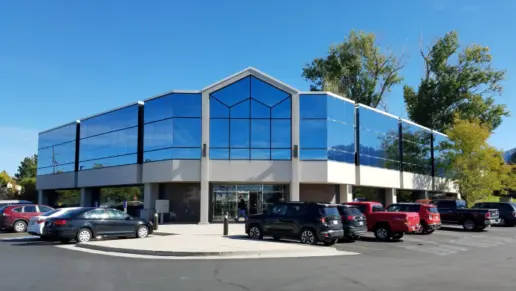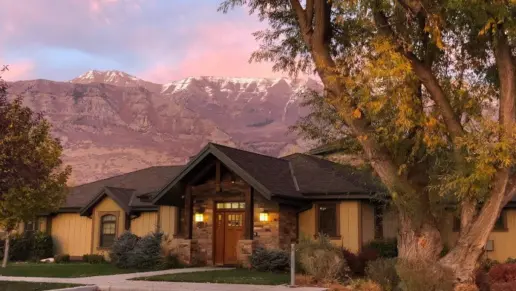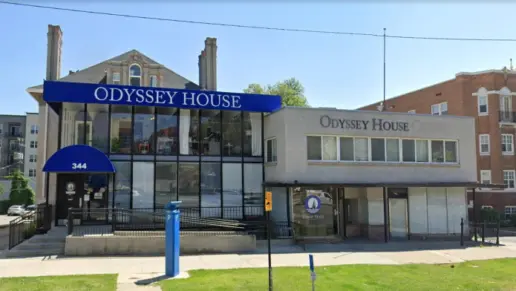The staff was understanding of my problem, they had experienced it, or seen it all before. I would highly recommend them!
About New Pathways Recovery and Wellness
Pathways at Centra provides comprehensive treatment for those struggling with drug and alcohol addiction and the many issues often associated with substance abuse. Their program targets the underlying causes of substance abuse disorder using holistic and clinical treatments. They serve adults on their private Lynchburg, VA campus. Pathways features inpatient residential services, intensive outpatient programs (IOP), and detoxification. They also have IOP exclusively for women.
Those who experience extreme symptoms of addiction are the best candidates for Pathways’ inpatient program, where they reside on campus and are closely monitored 24 hours a day. Treatment is delivered on a highly-structured schedule. Clients engage with a wide range of therapies, including individual and group therapy. The 12 Step modality is also a key component of treatment. Stays can last up to 28 days.
Detox is the process of removing the abused substances from your system in a safe and controlled environment overseen by professionals. Detox services are provided to clients in the Pathways at Centra inpatient program. Detox is often the first step in drug and alcohol abuse recovery.
IOP sees clients visiting the facility 4 days a week, 6 to 8 weeks total, 3 hours a visit. IOP allows you to receive treatment without sacrificing other responsibilities in your life. Much of the same treatment from inpatient care applies to IOP.
IOP is preferred for clients who don’t have severe symptoms and are currently in a stable living situation.
Women who are pregnant or have recently given birth experience unique challenges during the recovery process. Pathway’s exclusive IOP for women modifies the IOP program to address these concerns during treatment. Both IOP programs have a flexible schedule to accommodate clients.
MAT is an incredibly successful treatment method for substance abuse disorders. Under MAT, Pathways clinical staff give Suboxone to clients to reduce symptoms and cravings. Suboxone is not a substitute for therapy and counseling but is instead used alongside them to increase overall success.
Pathways works with government assistance programs in addition to offering financial aid to those who qualify.
Location
Location
Accepted Insurance
Other Forms of Payment
Private insurance refers to any kind of healthcare coverage that isn't from the state or federal government. This includes individual and family plans offered by an employer or purchased from the Insurance Marketplace. Every plan will have different requirements and out of pocket costs so be sure to get the full details before you start treatment.
Self-pay involves paying for treatment out of your own pocket. You can use savings or credit, get a personal loan, or receive help from family and friends to fund your treatment. If you don't have insurance or your insurance plan doesn't cover a specific program, self-pay can help ensure you still get the care you need.
Sliding scale payments are based on a client's income and family size. The goal is to make treatment affordable to everyone. By taking these factors into account, addiction recovery care providers help ensure that your treatment does not become a financial burden to you or your family, eliminating one barrier to care.
Addiction Treatments
Levels of Care
Treatments
The goal of treatment for alcoholism is abstinence. Those with poor social support, poor motivation, or psychiatric disorders tend to relapse within a few years of treatment. For these people, success is measured by longer periods of abstinence, reduced use of alcohol, better health, and improved social functioning. Recovery and Maintenance are usually based on 12 step programs and AA meetings.
When you enter a drug rehab in Utah, the process usually involves four stages: treatment initiation, early abstinence, maintaining abstinence, and advanced recovery. Treatment methods can rely on medications, counseling, or both, in either an outpatient or inpatient setting.
Many of those suffering from addiction also suffer from mental or emotional illnesses like schizophrenia, bipolar disorder, depression, or anxiety disorders. Rehab and other substance abuse facilities treating those with a dual diagnosis or co-occurring disorder administer psychiatric treatment to address the person's mental health issue in addition to drug and alcohol rehabilitation.
Opioid rehabs specialize in supporting those recovering from opioid addiction. They treat those suffering from addiction to illegal opioids like heroin, as well as prescription drugs like oxycodone. These centers typically combine both physical as well as mental and emotional support to help stop addiction. Physical support often includes medical detox and subsequent medical support (including medication), and mental support includes in-depth therapy to address the underlying causes of addiction.
Substance rehabs focus on helping individuals recover from substance abuse, including alcohol and drug addiction (both illegal and prescription drugs). They often include the opportunity to engage in both individual as well as group therapy.
Programs




Clinical Services
Group therapy is any therapeutic work that happens in a group (not one-on-one). There are a number of different group therapy modalities, including support groups, experiential therapy, psycho-education, and more. Group therapy involves treatment as well as processing interaction between group members.
Contact Information
435 West 400 South
Suite 101
Salt Lake City, UT 84101









